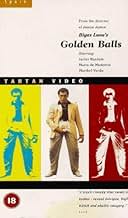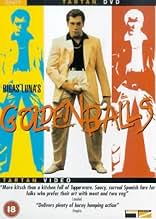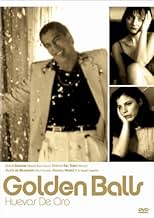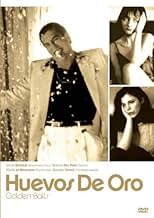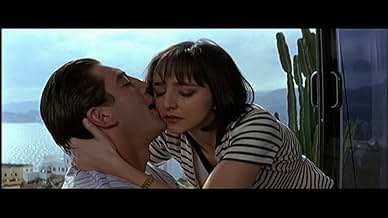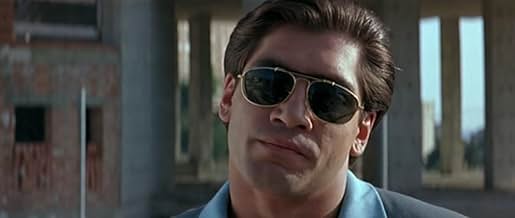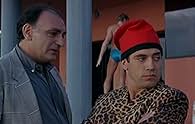Huevos de oro
- 1993
- 1h 35min
CALIFICACIÓN DE IMDb
6.1/10
4.1 k
TU CALIFICACIÓN
Un trabajador de construcción usa su encanto en un intento de obtener suficiente dinero para construir el proyecto de sus sueños.Un trabajador de construcción usa su encanto en un intento de obtener suficiente dinero para construir el proyecto de sus sueños.Un trabajador de construcción usa su encanto en un intento de obtener suficiente dinero para construir el proyecto de sus sueños.
- Premios
- 4 premios ganados y 3 nominaciones en total
Alessandro Gassmann
- El amigo de Melilla
- (as Alessandro Gassman)
Benicio Del Toro
- El amigo de Miami
- (as Benisio Del Toro)
Francesco Maria Dominedò
- El Mosca
- (as Francesco Mª Dominedo)
Francisco Casares
- El productor
- (as Paco Casares)
- Dirección
- Guionistas
- Todo el elenco y el equipo
- Producción, taquilla y más en IMDbPro
Opiniones destacadas
With some films it is really hard to tell for whom they were made. Huevos de oro seems to aim at the well educated Spanish middle class. There must be many inside jokes in this movie which you will not understand if you are an outsider. This can be pretty annoying.
Symbols and references to art and popular culture abound, the movie alludes to the work of Salvador Dalí, Luis Buñuel and the Surrealists in general, a certain infatuation with bidet baths seems to point to Duchamp's ready mades. What's more, the main character has also a knack for karaoke tapes with songs of Julio Iglesias. But why all this is mixed together in a rather pretty but also gratuitous way simply eludes me. I can only guess that it all serves to highlight the vital, impetuous, boorish vulgarity of the main character who the director seems to admire and despise at the same time. How all the really pretty women run after him (the main character, I mean) is slightly disconcerting.
The movie has three parts. It starts in the Spanish enclave of Melilla in Africa, where Benito, the main character, does his military service, apparently in the corps of engineers. Then it moves on to the resort town of Benidorm in Spanin where Benito just wants to build the highest skyscraper of the place and become a vulgarized Howard Roark. For the last part a defeated Benito moves to Miami, Florida, presumably in order to start a new life". But the change of places is not really explained satisfactorily. It is also somehow irritating that there is no character development and that the movie descends into a soap opera modus without being convincingly ironic. It must be said that Javier Bardem acquits himself very well playing the young stud who grows limp and deflated.
I purchased this movie because I am interested in townscapes. And Benidorm is a kind of a special place, townscapewise. In this aspect Huevos de oro satisfied me only partially. In Jess Franco's She Killed In Ecstasy (1970) this specific location was used in a more rewarding way.
Symbols and references to art and popular culture abound, the movie alludes to the work of Salvador Dalí, Luis Buñuel and the Surrealists in general, a certain infatuation with bidet baths seems to point to Duchamp's ready mades. What's more, the main character has also a knack for karaoke tapes with songs of Julio Iglesias. But why all this is mixed together in a rather pretty but also gratuitous way simply eludes me. I can only guess that it all serves to highlight the vital, impetuous, boorish vulgarity of the main character who the director seems to admire and despise at the same time. How all the really pretty women run after him (the main character, I mean) is slightly disconcerting.
The movie has three parts. It starts in the Spanish enclave of Melilla in Africa, where Benito, the main character, does his military service, apparently in the corps of engineers. Then it moves on to the resort town of Benidorm in Spanin where Benito just wants to build the highest skyscraper of the place and become a vulgarized Howard Roark. For the last part a defeated Benito moves to Miami, Florida, presumably in order to start a new life". But the change of places is not really explained satisfactorily. It is also somehow irritating that there is no character development and that the movie descends into a soap opera modus without being convincingly ironic. It must be said that Javier Bardem acquits himself very well playing the young stud who grows limp and deflated.
I purchased this movie because I am interested in townscapes. And Benidorm is a kind of a special place, townscapewise. In this aspect Huevos de oro satisfied me only partially. In Jess Franco's She Killed In Ecstasy (1970) this specific location was used in a more rewarding way.
This is a generally enjoyable send-up of the excesses of the 1980's:- the get-rich quick, looking after no. 1 culture which prevailed for a mercifully brief period. The anti-hero is a cynical building contractor who will do anything to achieve his aim of making a fortune out of nothing, regardless of the law or of any loyalty to those closest to him. Needless to say, he gets his come-uppance and the final scene in which he smashes a lavatory to pieces is vintage Bigas Luna.
Unfortunately, it doesn't quite manage to keep up the same pace as "Jamon Jamon" and, particularly after about half way through, it starts to lose its momentum and the viewer starts to lose interest. But there are one or two scenes which are so funny that they alone make the film worth seeing, e.g. the three-in-a-bed scene in which he suddenly realises that he is not the fantastic lover he had always imagined he was.
Unfortunately, it doesn't quite manage to keep up the same pace as "Jamon Jamon" and, particularly after about half way through, it starts to lose its momentum and the viewer starts to lose interest. But there are one or two scenes which are so funny that they alone make the film worth seeing, e.g. the three-in-a-bed scene in which he suddenly realises that he is not the fantastic lover he had always imagined he was.
This film is Spanish. This statement is not as obvious as you might think. Bigas Luna makes films so rich in Spanish cultural references that it is true that without previous knowledge, or better yet experience, of Spain then much of the film's charm will be lost. He parodies the stereotypes of spanish culture- the macho male most obviously, but there are numerous others- in such a way that anyone who accuses the characters of being over the top and unbelievable would very nearly be fully justified, if it wasn't that they are so instantly recognizable. Javier Bardem's character has wonderfully kitsch taste, most notably his attire and the obsession he has with Salvador Dali (to the point of outlining the famous 'drawers' across the bodies of all the women in his life). This goes a long way to creating the visual style which is somehow spot on for the mediterranean coast. The story itself is quite touching in the end, as a man of great passion and ambition rises from having nothing to having all he desires before the inexorable decent commences. There is much symbolism in this film for those who enjoy it. For example Bardem aims to erect the tallest building in town, yet as it fails and crumbles, so does his sexual potency. This film is admittedly an aquired taste, not for people who thrive on the tried and tested Hollywood formulae, unless they are willing to explore into the exotic and foreign world of Bigas Luna.
Bigas Luna's film is far from perfect, but I found it a sharp and caustic portrait of a particular lifestyle and a particular time and place in recent Spanish history - the 80's construction boom, the new rich and their unabashed cheesiness, the macho ibérico...Bardem's character is spot on, and he plays the role incredibly well. In fact, all of the performances are very good; it is the directing that occasionally fails the story. It does at times feel like the sex scenes outweigh all others, but I don't feel that they are gratuitous. Other than expensive accessories and a lust for skyscrapers, it is what Bardem's character spends most of his time and energy on. Maria de Medeiros and Maribel Verdú are excellent, especially the latter, who delivers a pretty brave performance. The cinematography is really beautiful and well conceived for each stage of the story. And it contains what must be one of my favorite cinematic moments in a long time...Bardem doing a Julio Iglesias karaoke number in a leopard-print robe, black speedo and Catalan barretina.
So, announces the DVD. But, this was a disappointing film. Not particularly bad but definitely not that good. Rather more crude and MTV video-like than the more subtle and masterful Jamon Jamon.
None of the characters are likable, the lovely Penelope Cruz of Bigas Luna's first film replaced by vacuous supermodels (in comparison, maybe they are great actresses) and it all reads like a tawdry and cheap paperback that you'd pick up at motorway service station.
Which, maybe is how Luna wanted it. Maybe he really is that repelled by the capitalist, nouveau-riche alpha male who believes his 'balls' not only rule his life but everybody else's, too. I know I am, and most people would be, too. Asked why Javier Bardem's lead character is sporting two gold Rolex's, he announces back "I have two balls, so I have two Rolex's".
Artistically there is little merit to this film, but it is about overblown, over-macho stereotypes and how they think they can walk over everybody. There are nods to Dali (the nude with ants over her pubic region is an extreme example) and there are more phallic insinuations in Goldenballs than any other film I know of. From Gonzalez (Bardem) Towers, intended to be the tallest tower on the Med, in which Luna loosely stretches a fabric of some kind of story around, with his dodgy dealings and cost-cutting.
Like, possibly his Tower, Gonzalez, and his potent sexual erections, does come a cropper, which is of some redemption, admittedly, but not enough to save the film. There's an early role for Benecio del Torro as the Miami-set gardener who happens to do more than service the sprinkler....
What finally made me only award two stars was the poor DVD quality. It's of video standard, plain and simple.
I bought Goldenballs as I wanted the three films in Luna's 'Iberian passion' trilogy, of which it is the middle. I'm seriously hoping that the final part, 'The Tit and the Moon' is an improvement.
None of the characters are likable, the lovely Penelope Cruz of Bigas Luna's first film replaced by vacuous supermodels (in comparison, maybe they are great actresses) and it all reads like a tawdry and cheap paperback that you'd pick up at motorway service station.
Which, maybe is how Luna wanted it. Maybe he really is that repelled by the capitalist, nouveau-riche alpha male who believes his 'balls' not only rule his life but everybody else's, too. I know I am, and most people would be, too. Asked why Javier Bardem's lead character is sporting two gold Rolex's, he announces back "I have two balls, so I have two Rolex's".
Artistically there is little merit to this film, but it is about overblown, over-macho stereotypes and how they think they can walk over everybody. There are nods to Dali (the nude with ants over her pubic region is an extreme example) and there are more phallic insinuations in Goldenballs than any other film I know of. From Gonzalez (Bardem) Towers, intended to be the tallest tower on the Med, in which Luna loosely stretches a fabric of some kind of story around, with his dodgy dealings and cost-cutting.
Like, possibly his Tower, Gonzalez, and his potent sexual erections, does come a cropper, which is of some redemption, admittedly, but not enough to save the film. There's an early role for Benecio del Torro as the Miami-set gardener who happens to do more than service the sprinkler....
What finally made me only award two stars was the poor DVD quality. It's of video standard, plain and simple.
I bought Goldenballs as I wanted the three films in Luna's 'Iberian passion' trilogy, of which it is the middle. I'm seriously hoping that the final part, 'The Tit and the Moon' is an improvement.
¿Sabías que…?
- TriviaSecond part of Bigas Luna's "Iberian Trilogy" also including Jamón Jamón (1992) and La teta y la luna (1994).
- ConexionesReferenced in El infiel (1997)
- Bandas sonorasHuevos de oro
(Theme)
By Nicola Piovani
Performed by the Orchestra dell'Unione Musicisti di Roma
Directed by Nicola Piovani
Violoncello soloist: Francesca Taviani
Selecciones populares
Inicia sesión para calificar y agrega a la lista de videos para obtener recomendaciones personalizadas
- How long is Golden Balls?Con tecnología de Alexa
Detalles
- Fecha de lanzamiento
- Países de origen
- Sitio oficial
- Idioma
- También se conoce como
- Golden Balls
- Locaciones de filmación
- Villajoyosa, Alicante, Comunidad Valenciana, España(Playa Casco Antiguo)
- Productoras
- Ver más créditos de la compañía en IMDbPro
Taquilla
- Presupuesto
- ₧420,000,000 (estimado)
- Tiempo de ejecución1 hora 35 minutos
- Mezcla de sonido
- Relación de aspecto
- 2.39 : 1
Contribuir a esta página
Sugiere una edición o agrega el contenido que falta


